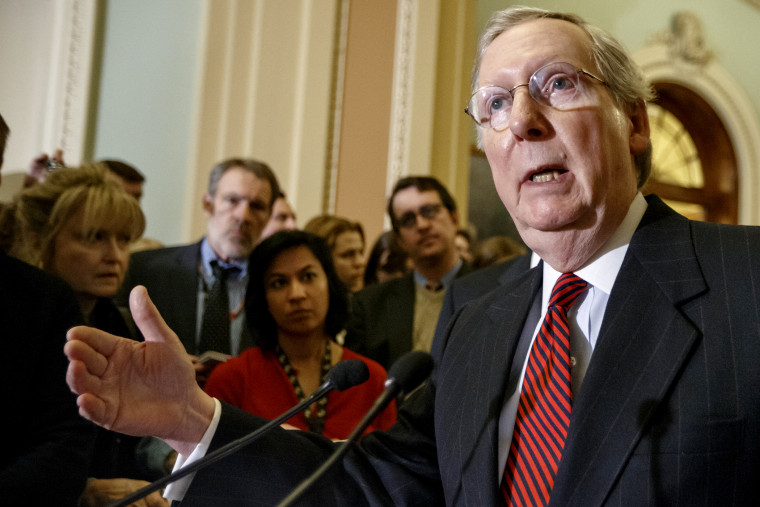In 2009 and 2010, Democrats enjoyed sizable majorities in the House and Senate, and they used that power to approve some landmark legislation. But as anyone who watched Capitol Hill over those two years knows, Dems wanted to do far more -- but were thwarted by Republican obstructionism.
Then-Senate Minority Leader Mitch McConnell (R-Ky.), ignoring the national election results, hatched a plan: he invested all of his energy in keeping his caucus together, blocking every Democratic proposal, rejecting every attempt at bipartisan outreach, and exploiting Senate procedural rules in ways with no precedent in the American tradition.
McConnell assumed, accurately, that the public at large has no understanding whatsoever of Senate procedures. All Americans would see is a Democratic House and Democratic Senate struggling at times to approve their own priorities in the face of GOP filibusters. The Republican leader gambled that the public would blame Dems, not the GOP, and that gamble quickly paid dividends.
Five years later, there's a Republican House and a Republican Senate that's struggling to approve far-right priorities, while Democrats play by the same rules McConnell wrote. And wouldn't you know it, the Kentucky leader is suddenly ready to remove the institutional roadblocks he used to find useful.
Senate Majority Leader Mitch McConnell (R-Ky.) is opening the door to changing the filibuster in response to growing pressure from Republicans angered that Democrats have blocked legislation from reaching the White House. McConnell has appointed a special task force to explore changes to the filibuster rule and other procedural hurdles -- including whether to eliminate filibusters on motions to proceed to legislation.
The task force, according to The Hill's report that has not been verified by MSNBC or NBC News, will include Sens. Lamar Alexander (R-Tenn.), Roy Blunt (R-Mo.), James Lankford (R-Okla.), Cory Gardner (R-Colo.), and Thom Tillis (R-N.C.).
McConnell, reflecting on the possible changes, said, “A number of the new senators have come in looking around saying, ‘Why are we doing things this way and not that way.'"
Yes, and I imagine there were some new Democratic senators who had the same reaction in 2009. At the time, McConnell said every obstructionist tool is sacrosanct, and if Democrats wanted to govern, that wasn't his problem.
It's funny what lessons leaders learn when they make the transition from minority to majority, isn't it?
For the record, I hope McConnell and his task force approve these procedural changes. Filibusters on motions to proceed, for example, have always struck me as a ridiculous hurdle without a credible defense.
What's irksome is not the fact that Senate GOP leaders want to help streamline the process, eliminating choke points, but rather, the Republican attitude that only they should be allowed to govern.
The Hill's piece added, "Frustrated House Republicans joined by a GOP presidential candidate and freshmen senators are clamoring for change."
Sure, and when Republicans were blocking every bill they possibly could in 2009 and 2010, there were plenty of Democrats clamoring for change, too. The answer was always the same: No.
The result was a Senate that was effectively broken by Mitch McConnell and his unprecedented tactics. Now that he's in charge, the GOP leader seems to effectively be saying, "Wow, I really made a mess of the place. I better start cleaning it up so I can get what I want."
Or as Lankford put it, “At times, the rules and practices of the Senate have left Americans and members of the Senate deeply frustrated. Senate systems that should serve the nation are currently blocking debate and slowing progress, instead of promoting it."
Yes, that's exactly right. Every word of Lankford's reaction is true. But again, that frustration was borne of Republican tactics, which Democrats have merely adopted in response. When Dems said five years ago, "Senate systems that should serve the nation are currently blocking debate and slowing progress, instead of promoting it," it was Mitch McConnell who said he didn't give a darn.
Indeed, he and his colleagues would routinely appear in media and make comments such as, "Democrats control both chambers, so what are they complaining about"? They'd conveniently pretend not to recognize the GOP's obstructionist tactics in causing the gridlock.
Now it's the Republican base that's furious, which evidently means it's time to change the rules -- because the GOP says so.
And if, in January 2017, McConnell finds himself as Minority Leader again, he can reverse course once more.
